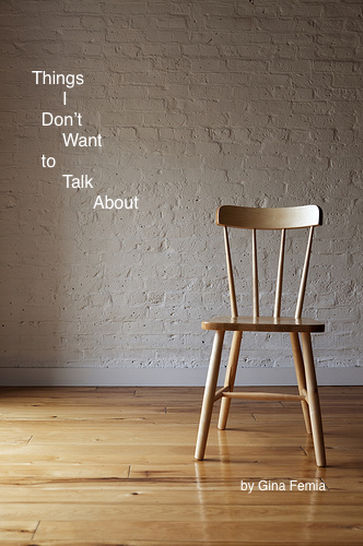Every year a bunch of playwrights take the city by storm and show off their talent in the hopes to get discovered. Many submit everywhere trying to get a chance. Many festivals seek to take advantage of this and make money from it. Others really like seeking new artists and help them develop their craft. And some of them are lucky enough to find the perfect playwright to match their company. This is the case when we talk about the March Forth Productions partnership with playwright superstar, Gina Femia. A match make in O’Neill heaven.
March Forth and Gina have been developing her new solo show “Things I Don’t Want to Talk About: a hero(ine)’s journey,” a truthful examination of being a sexual being and dealing with the things that come with it. Sound dark? Not with as charming of a voice as Gina Femia. Her plays have been produced all over the world, and they are only improving in quality. Now March Forth is producing “Things I Don’t Want to Talk About: a hero(ine)’s journey,” on September 8-10 at the Under St. Marks theater. Get to know this fantastic playwright below, and see why this production will be must see.
 Gina, your new play Things I Don’t Want to Talk About: a hero(ine)’s journey is opening up in a little bit more than a month at Under St. Marks, and you just had a play called The Mermaid Parade read at The Bonfire Series from the Pipeline Theater Company. This is besides a plethora of work being developed with different companies and collaborators. In other words, wow, you are very prolific and you get produced which is great. Could you tell me what motivates you to be a playwright and what gives you the need to work on so many projects at the same time?
Gina, your new play Things I Don’t Want to Talk About: a hero(ine)’s journey is opening up in a little bit more than a month at Under St. Marks, and you just had a play called The Mermaid Parade read at The Bonfire Series from the Pipeline Theater Company. This is besides a plethora of work being developed with different companies and collaborators. In other words, wow, you are very prolific and you get produced which is great. Could you tell me what motivates you to be a playwright and what gives you the need to work on so many projects at the same time?
My little personal philosophy that helps me keep going is: Nobody can ever forbid me from writing. No matter how many rejections I receive in my e-mail, they’re not telling me I can’t write, they’re just saying Not right now. That helps me keep going.
I have the desire and the drive and the need to write, so I made a promise to myself to always do so. I’ve been really lucky to surround myself and discover people whose drive or aesthetic matches my own; many of my projects have been initiated independently or supported by those companies whose mission statements match my own.
In these last 3 years, I have become particularly prolific because I finally embraced my voice as a playwright. I was censored for many years from people who discouraged me from telling my truth. A lot of them were well meaning voices; some of them were self-serving. But in the past 3 years, I’ve been supported both personally and professionally to tell my story and explore my truth, so it’s like a dam was broken inside of me and I can’t do anything but write. It’s an exhilarating, exhausting and intensely satisfying place to be in and gives me the drive to continue to create.
I find I’m most comfortable when I’m working on many plays at the same time because it stretches out my brain and doesn’t give me the luxury of obsessing over one particular project. I’m forced to make quick decisions, to get something down on the page to see whether or not it works. I dread writing the first draft – I’d much rather get to the second draft so I can see the roadmap of the play and fix it up. Rewriting for me is writing; that’s where I discover the joy of the play.
As a playwright, what do you think is your biggest challenge in New York City? And as Brooklyn native (And #1 fan,) how does the borough inspire you to get through those challenges?
New York City is an incredible beast! There are so many pockets of theatre, it can be overwhelming, especially if you don’t find your community. There were times in my first few years out of grad school I was ready to give up. I was self producing workshops and readings and tried founding a writer’s group and burned myself out like ten times in one year. But I kept reminding myself that nobody can tell me not to write and kept pushing myself to keep writing; that’s what kept me going. So I kept writing and started submitting plays everywhere I could and putting myself out there and I’m so lucky that people have started to listen.
Being a Native of Brooklyn, and as you so kindly say, her number 1 fan, gives me a secondary drive to keep going. Brooklyn is my home; there’s nowhere else I’d like to learn how to live. I’ll do anything to stay here. I’m incredibly inspired by the stories that inhabit this borough, by the people who live here and who continue to live here. This love has been woven in the last 4 or 5 plays I’ve written, and it makes me feel like I’m standing in my purpose whenever I write them. So often the stories of the working class of Brooklyn go unheard; I have the need to explore them and tell them. I think it’s important these stories are represented, that the stories of my family and friends be able to see themselves on stage. I want as many people to see themselves on stage, whether through stories or characters or both. Theatre shouldn’t exclude; it should embrace.
This new play coming up, Things I Don’t Want to Talk About: a hero(ine)’s journey, is a solo show. I read an earlier draft, and to say it’s personal would be an understatement. You open the book of your life for us to see. What made you create such a personal work? How was the process of developing the play? Was it maddening to relive your life, or did it exorcise some demons?
This is an incredibly accurate description of the show! Yes, it’s a deeply personal and autobiographical account of my sexuality, literally being a journey through my brain to have an orgasm. I was inspired to tell my story when all those women came out with their stories about Bill Cosby. The bravery it required, how similar they were to one another and how similar they were to mine somehow gave me the strength to spill my story out into words.
The first draft came out in less than a week and it was a big, messy document full of stories and no structure. It was just such a release and a relief to put what I’ve held inside to words. It’s been extremely empowering to continue giving life to this tale. There are parts that are definitely harder than others to discuss and get through, but it’s ultimately empowering. I want to tell this story because there are so many like it that go unspoken. But the more we can see and recognize them, the more other women and men and people will speak up. And, even more importantly, see that they are not alone.
You are doing Things I Don’t Want to Talk About: a hero(ine)’s journey with March Forth productions. They’ve been part of the development since the very start. How did you end up trusting them with such an intimate piece and how have they supported you throughout?
After I finished that first fast draft, I asked the people of Facebook if anyone wanted to read the play and give me feedback. Although I had written several solo shows before this one, none of them had been autobiographical. Luckily, Eric C. Webb, Artistic Director of March Forth Productions answered the call. We had only known one another for about a month – a play of mine was chosen for their fabulous Summer Reading Salon. He read the play, messaged me saying Wow and asking if he could forward it to his partner, Laura Archer, Founder and Executive Director. I said yes and the rest is history.
March Forth Productions wants to support the play and the artist in tandem, to give them what they need in order to tell the story they want to tell in the way it wants to be told. We had scheduled a staged reading performance to take place the first week of April. On our first rehearsal in early February, I told everyone in the room that I had reconceived the entire show and that I needed 2 weeks to rewrite it – and completely restructure it. Instead of balking or telling me that there wasn’t enough time, they said Okay, what do you need from us?
Thankfully, Eric also happens to be a brilliant dramaturg. Under his guidance and his gentle nudging, he pushed me to crack the play wide open. I turned it into an epic adventure through my brain and I felt supported the entire time. Both Eric and Laura’s supportive and positive encouragement has been the key to getting this play where it is and gives me the courage to continue exploring it.
In a solo show just like this one, the relationship between director and actor has to be very tight. How did you go about choosing the right partner? What about Taylor Reynolds told you you could trust her?
March Forth Productions set up a series of auditions for directors which I thought was an ingenious way to choose a director for this project. They asked directors to come in, choose a section of the play and play with me. We asked a combination of directors, some whom I knew really well and some I wanted to get to know better.
I had known Taylor for 3 years by then. We had worked on a series of different plays together – and we also happen to be close friends. In the end, I knew that the combination of her brilliance as a director and the kindness in her friendship would be the ideal recipe to develop this show to its fullest.
Taylor has taken moments where I’ve said “I have no idea how to stage this” and has made it all make sense. She both pushes me as a performer and makes me feel safe. And when things get to be too overwhelming for me in rehearsal, she’s the person I can turn to and start joking. She puts up with a LOT of puns. She’s an adventurous director with a brilliant eye and a kind soul. I’m lucky whenever I get the chance to work with her, but especially to get to explore this play with her.
Collaborations are such an integral part of the theatrical process, yet many playwrights seem to have an aversion to it. Does this aversion comes from fear of losing their work, or is it an ego thing? How do you feel about it? What do you learn from it, if anything? Does it work for every play or is it based on the project?
Truly, I don’t know – I love collaborations! It’s the core of theatre. It’s part of why I hate writing the first draft, because I have to do that by myself. As soon as I have the draft, I can start to play. I can reach out to directors and get actors in a room. Even before that, I speak with designers about exploring concepts, about what if’s and can we’s. I feel like if we don’t open ourselves up to collaborations, we aren’t doing our plays or our theatre justice. It’s about what we can give to one another in order to create something powerful, something meaningful. Life is about collaboration and theatre is the art that epitomizes that. And I love it.
Do you ever do any other type of writing? What other aspects or types of writing interest you past the dramatic arts?
I have the beginnings of two novels that I desperately want to work on, but just haven’t prioritized them – yet. I’m hoping to have one done by 2018. I’ve also recently gotten into writing short screenplays and absolutely love it. There’s a different freedom I’ve found in writing and exploring them that’s extremely exciting.
What, in your opinion, are the best theater companies in NYC working with, and for, women? What companies would you recommend for fresh off-the-oven playwrights?
New Georges is, in my opinion, the premiere theatre company working with and for women. They support women’s stories with big ideas. Lots of my favorite theatre companies have supported a 50/50 Parity – there’s Pipeline Theatre Company, Fresh Ground Pepper, Flux Theatre Ensemble and The Habitat to just name a few. I’m also a huge fan of New York Madness and a proud Company Member! I recommend any fresh off-the-oven playwrights to check out all of those companies – go see their shows, mingle at their events, introduce yourself, get to know them so they can get to know you!
What’s next for Gina Femia?
I’ll be performing Things I Don’t Want to Talk About: a hero(ine)’s journey on September 8, 9 and 10!
After that, I’ll be getting ready for a two-week workshop of For The Love Of (or the roller derby play) in October. I’m also happily developing my long neglected play We Are The Gods with Random Access Theatre as part of their RAWR program, which I’m super excited about. Director Michele Travis and I are going to be getting in a room and playing with my supermarket play, Savings.
And my writer’s groups will be starting up and continuing – Lather, Rinse, Repeat: A Playwright’s Collective (which contains some of the most creative and supportive playwrights in the world) and Coffee Klatsch, which Jen Browne and I began for Brooklyn playwrights to get together and write.
Twisted Talk: What are some of your favorite theater companies in the city? Have you seen any of Gina’s productions? Discuss below!








